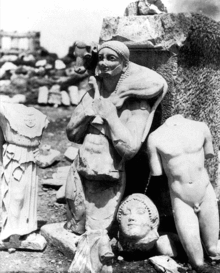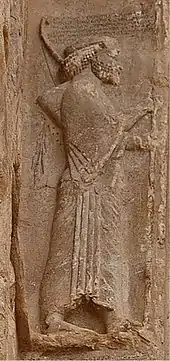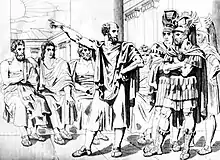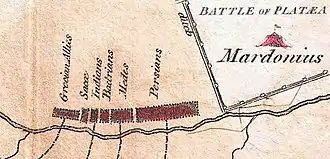Mardonius (nephew of Darius I)
Mardonius (Old Persian: 𐎶𐎼𐎯𐎢𐎴𐎡𐎹 Mr̥duniyaʰ; Greek: Μαρδόνιος Mardónios;[1] died 479 BC) was a leading Persian military commander during the Persian Wars with Greece in the early 5th century BC who died at the Battle of Plataea.
Early years
Mardonius was the son of Gobryas, a Persian nobleman who had assisted the Achaemenid prince Darius when he claimed the throne. The alliance between the new king and his friend was cemented by diplomatic marriages: Darius married Gobryas' daughter, and Gobryas married Darius' sister. Furthermore, Mardonius married Darius' daughter Artozostra. Thus, Darius the Great was simultaneously Mardonius' uncle, father-in-law, and half-brother-in-law.[3]
Persian Wars with the Greeks
First Persian invasion of Greece
Darius appointed Mardonius as one of his generals and, after the Ionian Revolt, sent him in 492 BC to retaliate against the Greek city-state of Athens for assisting the Ionians. On his way to Athens, he used his army in the Ionian cities to depose the Greek tyrants and set up democratic governments, an action which surprised the Greeks at that time. Historians consider that he may have taken this action so that the Ionians would not revolt a second time after the Persian army had passed through.[4] His fleet and army then passed across the Hellespont. Mardonius first attacked Thasos, a Greek island which possessed gold mines. It became a tributary of the Achaemenid empire. The navy and the army continued onto Macedonia, which was soon added to the Persian Empire as a fully subordinate client kingdom, becoming also part of its administrative system.[5][6]
However, after these victories, Mardonius’ fleet was destroyed in a storm off the coast near Mount Athos. According to Herodotus, the Persians lost 300 ships and 20,000 men. Around this time, Mardonius was commanding the army in a battle in Thrace. While Mardonius was wounded in the battle, he was victorious, re-subjugating Thrace into the empire.[7] Nevertheless, the loss of the fleet meant that he had to retreat back into Asia Minor.[8] He was relieved of his command by Darius, who appointed Datis and Artaphernes junior to lead the invasion of Greece in 490 BC, and though they were subsequently successful in capturing Naxos and destroying Eretria, they were later defeated at the Battle of Marathon.
Second Persian invasion of Greece

Mardonius came back into favour under Darius' successor Xerxes I, Mardonius' cousin and brother-in-law. Xerxes was at first not interested in renewing the war with Greece, but Mardonius, who had the most influence on Xerxes in all of Persia,[9] repeatedly tried to convince him that he must avenge Darius' defeat. This view was opposed by another of Xerxes’ advisors, Artabanus, who urged more caution in the matter. Herodotus, who portrays Mardonius as a somewhat evil adviser (as opposed to a number of other good advisers whose arguments are never followed), says that Mardonius simply wanted to become satrap (governor) of Greece and had a love for 'mischief and adventure'.[10]
He was present at the Battle of Thermopylae, and after the Persian defeat at the Battle of Salamis, he attempted to convince Xerxes to stay and fight yet another campaign. This time Mardonius could not persuade Xerxes, but when Xerxes left he did become governor of those parts of Greece that had been conquered by the Persians. He subdued Macedon, ruled at that time by King Alexander I, but Alexander himself gave valuable information about Mardonius' plans to the Athenians, saying that, as a Greek, he could not bear to see Greece defeated.
After the first part of the campaign directly under the orders Xerxes I, Mardonius remained in Greece with 300,000 elite troops, who fought in the last stages of the war, destroying Athens, but being finally vanquished at the Battle of Platea:[11]
Mardonius there chose out first all the Persians called Immortals, save only Hydarnes their general, who said that he would not quit the king's person; and next, the Persian cuirassiers, and the thousand horse, and the Medes and Sacae and Bactrians and Indians, alike their footmen and the rest of the horsemen. He chose these nations entire; of the rest of his allies he picked out a few from each people, the goodliest men and those that he knew to have done some good service... Thereby the whole number, with the horsemen, grew to three hundred thousand men.
Mardonius captured and sacked Athens, which had been deserted before the Battle of Salamis. He offered to return Athens and help rebuild the city if the Athenians would accept a truce, but the Athenians rejected the truce and prepared for another battle.
Plataea and death of Mardonius
Mardonius prepared to meet them at Plataea, despite the opposition from another Persian commander, Artabazus, who, like Artabanus, did not think that the Persian army could automatically defeat the Greeks. Mardonius was killed in the ensuing battle by the Spartans (see Battle of Plataea). It is claimed by Herodotus[14] and Plutarch[15] a Plataean called Aeimnestus killed Mardonius. This led to his army breaking up.
Herodotus relates of the Spartan leader Pausanias’ response when an Aeginetan suggests mounting on a pole the head of the slain Persian general Mardonius, as Xerxes had wanted to do to Leonidas after the battle of Thermopylae—a suggestion taken by Pausanias to threaten the very root of civilization: "Such doings befit barbarians rather than Greeks, and even in barbarians we detest them...Come not before me again with such a speech nor with such counsel, and thank my forbearance that you are not now punished".
In popular culture
- His name is given to the genus Mardonius (family Spirostreptidae), which contains nine species of giant African millipedes.
- In the movie The 300 Spartans (1962), Mardonius is portrayed by actor Kostas Baladimas uncredited[16]
- In the novel Creation by Gore Vidal, Mardonius is portrayed as a lifelong friend of Xerxes and Cyrus Spitama the grandson of the prophet Zoroaster.
- In the video game 300: March to Glory, Mardonius is the top boss that you must fight 4 times: In the end of "The Third Day", and 3 times in "Battle of Plataea": once on his rhino, once with his armour and once where you kill him as Dillios.
- In the novel Gates of Fire by Steven Pressfield, Mardonius is portrayed as one of Xerxes's most trusted advisors, along with Orontes, captain of the Immortals, and the warrioress Artemisia.
Notes
- Jan Tavernier (2007). Iranica in the Achaemenid Period (ca. 550-330 B.C.). Peeters Publishers. p. 19. ISBN 978-9042918337.
- Kuhrt, Amélie (2013). The Persian Empire: A Corpus of Sources from the Achaemenid Period. Routledge. p. 450. ISBN 9781136017025.
- Gobryas (conspirator) - Livius.
- Herodotus 6, 43
- Joseph Roisman,Ian Worthington. "A companion to Ancient Macedonia" John Wiley & Sons, 2011. ISBN 144435163X pp 343-345
- Vasilev 2015, p. 156.
- Joseph Roisman,Ian Worthington. "A companion to Ancient Macedonia" John Wiley & Sons, 2011. ISBN 144435163X pp 343-345
- Herodotus 6, 44-45
- Herodotus (1998). The Histories. Oxford University: Oxford University Press.
- Herodotus 7, 5-6
- Tola, Fernando (1986). "India and Greece before Alexander". Annals of the Bhandarkar Oriental Research Institute. 67 (1/4): 159–194. JSTOR 41693244.
- The Histories. Penguin UK. 2013. p. 484. ISBN 9780141393773.
- LacusCurtius • Herodotus — Book VIII: Chapters 97‑144. p. Herodotus VIII, 113.
- Herodotus 9, 65
- Plutarch's Lives, Aristides 19
- "The 300 Spartans (1962) Full Cast & Crew". IMDb. Retrieved 2013-10-24.
References
- Herodotus - The Histories, with an English translation by A. D. Godley. Cambridge, Harvard University Press, 1920. OCLC: 1610641 ISBN 0-674-99130-3, ISBN 0-674-99131-1, 0674991338, 0674991346
- Vasilev, Miroslav Ivanov (2015). The Policy of Darius and Xerxes towards Thrace and Macedonia. BRILL. ISBN 978-9-00-428215-5.


